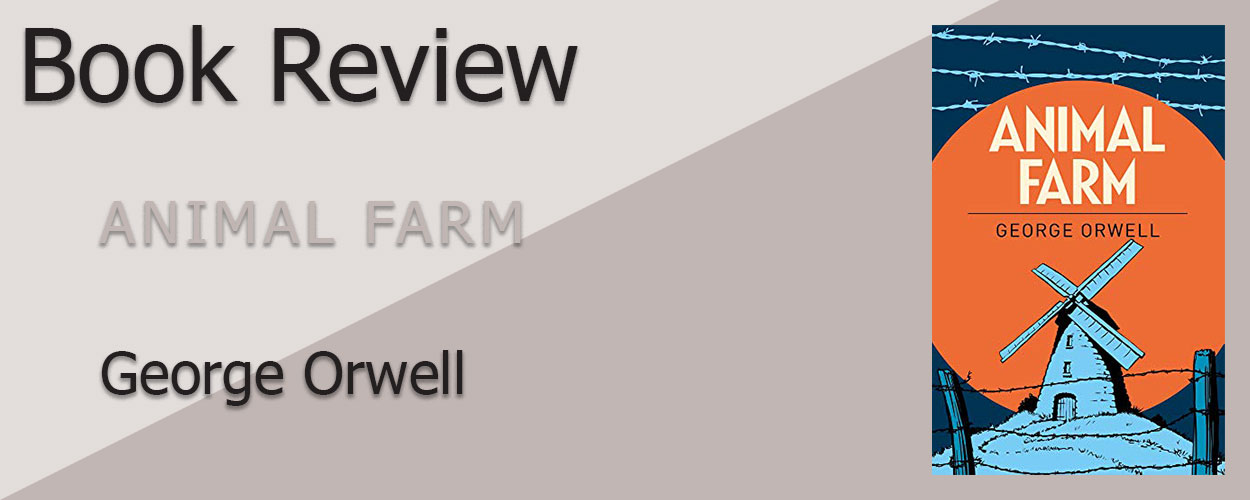

I really liked it
I first read this book for a class in high school (who hasn’t?) but only recently found it while browsing my local bookstore. I bought the book on a whim and started reading it less than an hour later to pass the time while getting my hair done.
Genre: Classic, Fable, Dystopia
Read: August 16 – August 17, 2022
Audience: General
Book contains: totalitarianism, manipulation, gaslighting
Purchase a copy from Amazon.ca
Manor Farm was once run by Mr Jones, a cruel, neglectful farmer, and after one infraction too many, the animals fight back. With Jones expelled, Manor Farm becomes Animal Farm, the only farm in England to be run entirely by four-legged comrades. However, when the pigs begin to fill out the power imbalance on the farm, and the other animals are not clever enough to point out the unfairness of the new rules being established, their once-dreamed-about paradise grows darker by the day.
This is the kind of book that makes me angry at the same time as I read, though I’m unable to put it down. With hindsight, any reader can see how mistreated the animals are being, though they themselves don’t realize the problem, as many of them are too simple-minded to know anything else but cruelty. It’s almost annoying how clueless they are, in my opinion, so much so that it seems like it’s only for plot convenience, but then you think about how this situation is something the animals have never experienced before, and nearly all of them never had to think much before the rebellion.
Out of all the characters, I—along with everyone else who read the book—hated the pigs. I specifically hated them because, in the beginning, it’s pointed out that humans were the only creatures on the farm who didn’t produce from themselves, though the same point can be argued about the pigs. Pigs are generally kept for breeding and for meat, but once Jones was expelled, what were they good for? They don’t give milk, nor produce eggs, nor were they big and strong like a horse—it was only logical that they would take over from the humans as the “masterminds” of the farm, so to speak, and thus, the descent into darkness and vices.
If you’re looking for a happy ending, this isn’t the book for you. There is no grand resolution in which the animals take on a second revolution, nor do their lives get better by the last page. The book ends on a sour note of realization between the “lesser” animals on the farm, in which they realize that their comrades, the pigs, have come to resemble the humans they’d feared and hated so much.
I feel like I can say this without much spoiler warning because this is a dystopian genre and as such doesn’t have a happy ending. The resolution is also hinted at quite a bit throughout the short book.
The copy of the book that I purchased is very simply designed and because of its length, has fewer than one hundred pages. There are ten chapters, and each are laid out well; though there aren’t chapter names, each has a miniature story arc within. I find that the writing has a decent balance of scenes to summary. Long periods of passing time are summed up by the most important events, interspersed between scenes that give the story its meaning.
Something prevalent within the story—and very obviously a warning—is the gaslighting done by the pigs upon the other animals. After the initial revolution, seven commandments were written upon the barn, and throughout the story, as the pigs violate these commandments, the commandments change. This is done in the night by one of the pigs, who would add a word here or there so that the pigs may continue their actions without consequences. Since many of the animals lack reading skills and have such poor memory, they are easily convinced that they have collectively remembered wrong. The cleverness of the pigs is that they take advantage of the other animals’ lack of intelligence, constantly leading them to believe that they are “not smart enough to understand” the genius of the pigs’ minds. And, of course, the constant threat of Jones returning keeps the animals deep enough in their fear to mute any protests they may have. I hate it.
I recommend this book to anyone who wants to widen their understanding of the world and learn its cruelty so that they may fight against injustice. Keep in mind that this is political satire. This book takes it to the extremes, but it is based in real-world history, and I believe we should all understand that there are people out there who are cruel for the sake of their own privilege, however sad that may be.
Animal Farm by George Orwell
1984 by George Orwell
The Hunger Games Book 1: The Hunger Games by Suzanne Collins
Divergent Book 1: Divergent by Veronica Roth
Crime and Punishment by Fyodor Dostoevsky
Tigerpetal Press is a small book press dedicated to publishing local authors and poets.